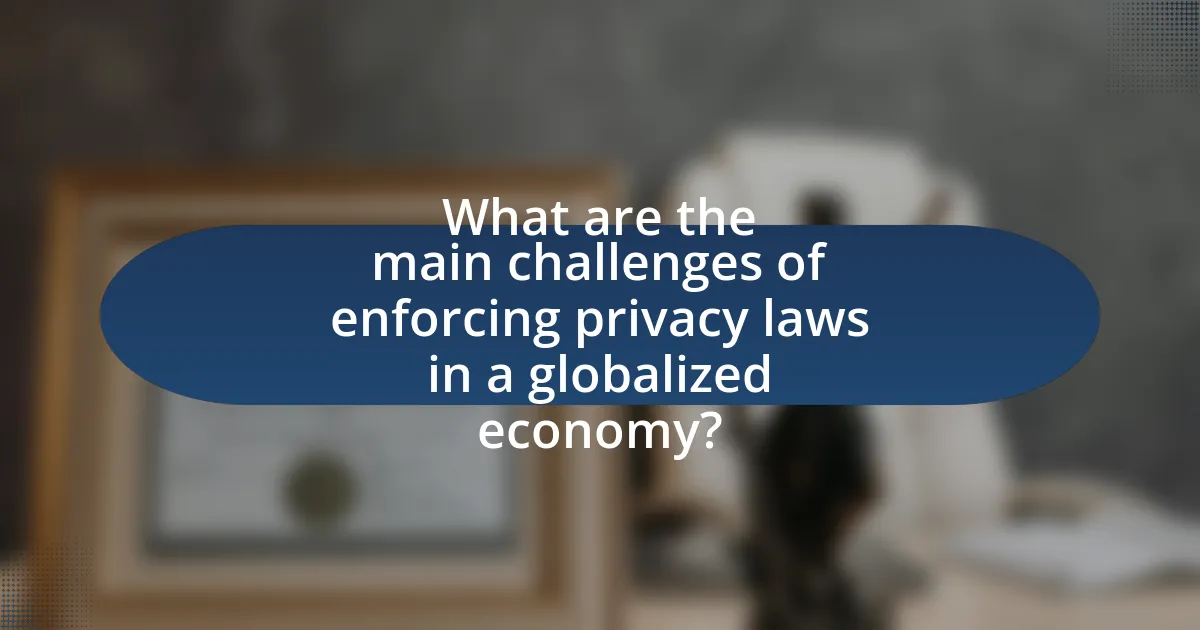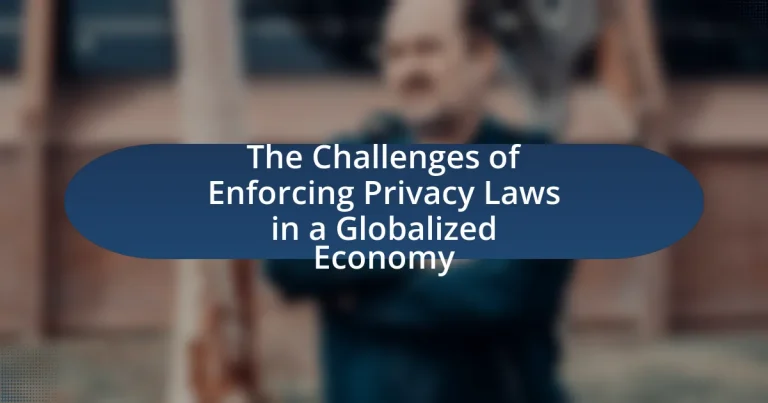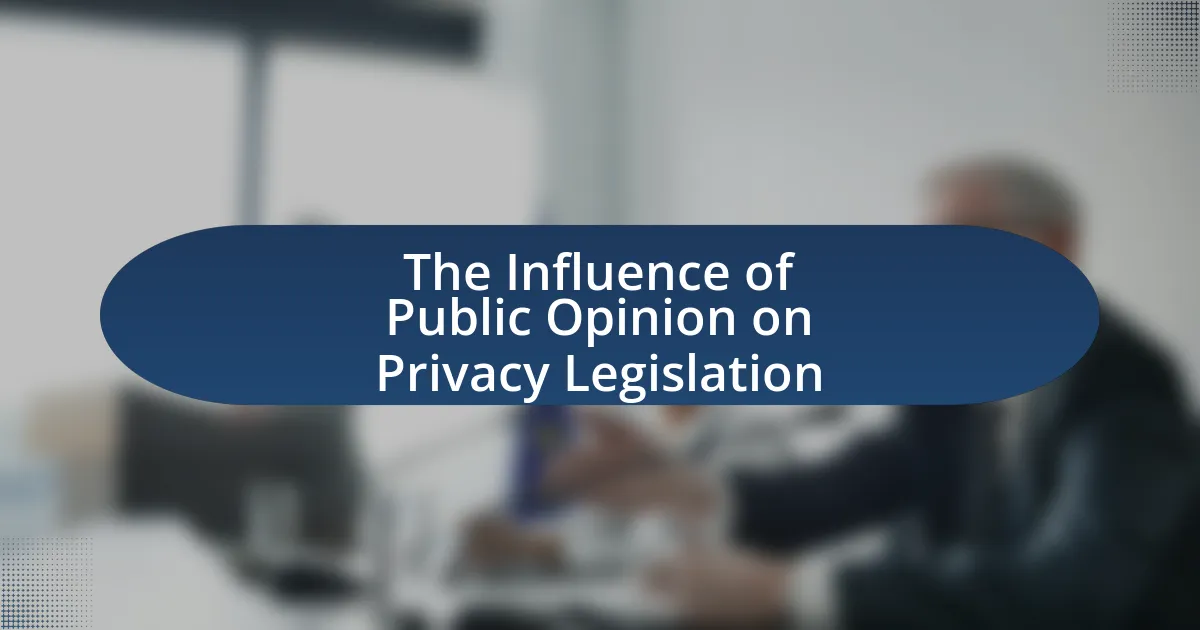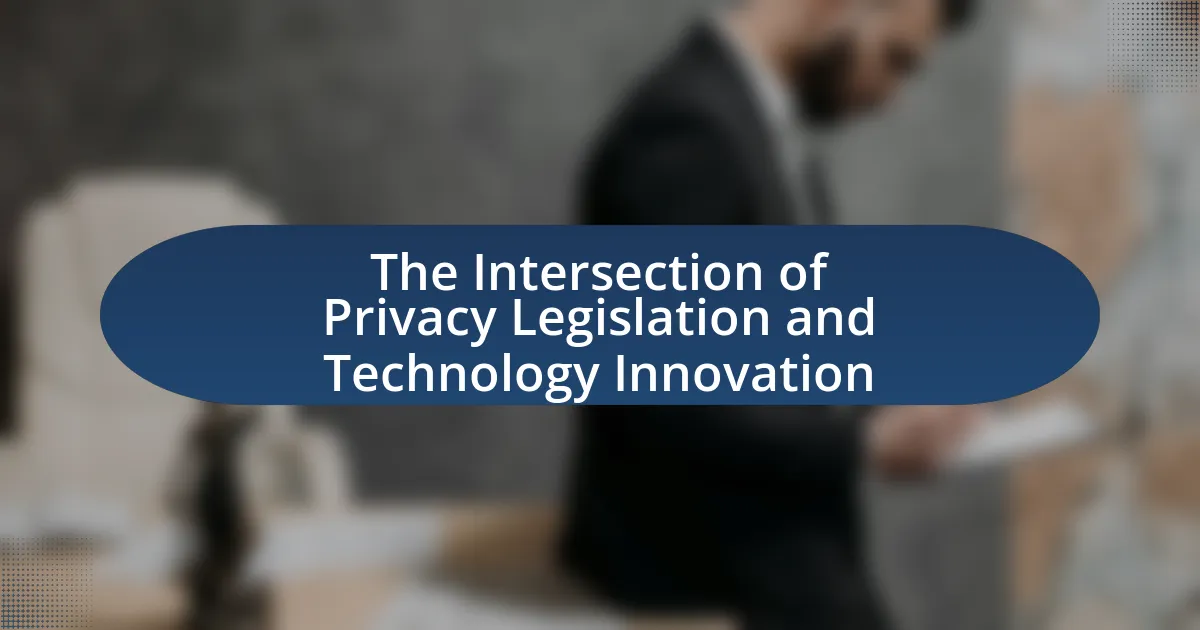The article examines the challenges of enforcing privacy laws in a globalized economy, highlighting key issues such as jurisdictional conflicts, varying legal standards, and the rapid pace of technological advancements. It discusses how globalization complicates privacy law enforcement by facilitating cross-border data flows and creating inconsistencies in compliance requirements for multinational corporations. The article also addresses the implications of conflicting regulations on businesses, the obstacles faced in achieving compliance, and the influence of cultural differences on privacy perceptions. Additionally, it explores the impact of emerging technologies on privacy regulations and emphasizes the importance of international cooperation and best practices for organizations to navigate these complexities effectively.

What are the main challenges of enforcing privacy laws in a globalized economy?
The main challenges of enforcing privacy laws in a globalized economy include jurisdictional issues, varying legal standards, and the rapid pace of technological change. Jurisdictional issues arise because data often crosses national borders, complicating the enforcement of laws that differ from one country to another. For example, the European Union’s General Data Protection Regulation (GDPR) imposes strict requirements that may conflict with less stringent regulations in other regions, creating compliance difficulties for multinational companies. Additionally, varying legal standards lead to inconsistencies in how privacy is defined and protected, making it challenging for businesses to navigate compliance across different jurisdictions. The rapid pace of technological change further complicates enforcement, as new technologies can outstrip existing legal frameworks, leaving gaps in protection and enforcement capabilities. These factors collectively hinder effective enforcement of privacy laws in a globalized economy.
How does globalization impact the enforcement of privacy laws?
Globalization complicates the enforcement of privacy laws by creating a landscape where data flows across borders, often outpacing regulatory frameworks. As businesses operate internationally, they encounter varying privacy standards, which can lead to conflicts and challenges in compliance. For instance, the European Union’s General Data Protection Regulation (GDPR) imposes strict data protection requirements, while other regions may have less stringent laws, creating a disparity that companies must navigate. This inconsistency can hinder effective enforcement, as jurisdictions may lack the authority to regulate data practices occurring outside their borders, leading to potential violations of privacy rights.
What specific aspects of globalization complicate privacy law enforcement?
Globalization complicates privacy law enforcement primarily due to the cross-border flow of data, differing national regulations, and the involvement of multinational corporations. The cross-border flow of data means that personal information can easily move between jurisdictions with varying privacy standards, making it difficult to enforce laws consistently. Additionally, countries have different legal frameworks regarding privacy, which creates challenges in harmonizing enforcement efforts. For instance, the European Union’s General Data Protection Regulation (GDPR) imposes strict rules, while other regions may have more lenient regulations, leading to compliance difficulties for companies operating globally. Furthermore, multinational corporations often operate in multiple countries, complicating the enforcement of local privacy laws as they may prioritize compliance with the most stringent regulations, potentially neglecting local legal requirements.
How do cross-border data flows affect privacy regulations?
Cross-border data flows complicate privacy regulations by creating jurisdictional challenges and inconsistencies in legal frameworks. When data is transferred across borders, it often falls under the laws of multiple jurisdictions, leading to conflicts between differing privacy standards, such as the General Data Protection Regulation (GDPR) in Europe and less stringent regulations in other regions. This complexity can hinder compliance efforts for businesses operating internationally, as they must navigate varying requirements and potential penalties for non-compliance. For instance, a 2020 report by the International Association of Privacy Professionals highlighted that 70% of organizations face difficulties in aligning their data practices with multiple regulatory regimes due to these cross-border flows.
What role do different jurisdictions play in privacy law enforcement?
Different jurisdictions significantly influence privacy law enforcement by establishing varying legal frameworks, regulatory bodies, and enforcement mechanisms. For instance, the European Union’s General Data Protection Regulation (GDPR) sets stringent privacy standards that apply across member states, while the United States employs a sectoral approach with laws like the California Consumer Privacy Act (CCPA) that vary by state. This divergence creates challenges for multinational companies, as they must navigate a complex landscape of compliance requirements. Additionally, jurisdictions may have different interpretations of privacy rights, leading to inconsistencies in enforcement and protection levels. For example, the GDPR emphasizes individual consent and data protection, whereas other jurisdictions may prioritize business interests, affecting how privacy laws are applied and enforced globally.
How do varying privacy laws across countries create enforcement challenges?
Varying privacy laws across countries create enforcement challenges by establishing differing standards for data protection, which complicates compliance for multinational organizations. For instance, the European Union’s General Data Protection Regulation (GDPR) imposes strict requirements on data handling, while countries like the United States have a more fragmented approach with sector-specific regulations. This inconsistency leads to difficulties in ensuring that companies adhere to all applicable laws when operating in multiple jurisdictions, as they must navigate a complex landscape of legal obligations that can conflict with one another. Additionally, the lack of a unified international framework for privacy enforcement means that legal recourse can be limited, making it harder to hold organizations accountable for violations across borders.
What are the implications of conflicting regulations on businesses?
Conflicting regulations create significant challenges for businesses, leading to increased compliance costs and operational complexities. When companies operate across jurisdictions with differing legal requirements, they must navigate a maze of regulations that can result in confusion and potential legal penalties. For instance, a business that collects personal data may face stringent privacy laws in one country while being subject to less restrictive regulations in another, complicating their data management strategies. This situation can lead to inconsistent practices, risking non-compliance and damaging the company’s reputation. Additionally, conflicting regulations can hinder innovation and market entry, as businesses may be deterred from expanding into regions with unclear or contradictory legal frameworks.
Why is compliance with privacy laws difficult for multinational corporations?
Compliance with privacy laws is difficult for multinational corporations due to the varying legal frameworks across different jurisdictions. Each country has its own set of regulations regarding data protection, such as the General Data Protection Regulation (GDPR) in the European Union and the California Consumer Privacy Act (CCPA) in the United States, which can create conflicting requirements. For instance, GDPR mandates strict consent protocols and data subject rights, while other regions may have less stringent rules, complicating the implementation of a uniform compliance strategy. Additionally, the complexity increases with the need to navigate cultural differences in privacy expectations and the potential for significant penalties for non-compliance, which can reach up to 4% of a corporation’s global revenue under GDPR.
What are the common obstacles faced by companies in achieving compliance?
Companies commonly face several obstacles in achieving compliance, including complex regulatory environments, lack of resources, and insufficient employee training. The complexity arises from varying laws across jurisdictions, making it difficult for organizations to navigate and implement the necessary measures. A lack of resources, both financial and human, often hinders the ability to establish robust compliance programs. Additionally, insufficient training for employees can lead to non-compliance due to a lack of understanding of regulations and internal policies. According to a survey by PwC, 55% of organizations reported that regulatory complexity is a significant barrier to compliance, highlighting the widespread nature of these challenges.
How do cultural differences influence privacy perceptions and compliance?
Cultural differences significantly influence privacy perceptions and compliance by shaping individuals’ attitudes toward personal data and its protection. For instance, in collectivist cultures, such as those in East Asia, individuals may prioritize community welfare over personal privacy, leading to a more lenient view on data sharing. Conversely, in individualistic cultures like those in North America and Western Europe, there is a stronger emphasis on personal autonomy and privacy rights, resulting in stricter compliance with privacy regulations. Research by the International Association of Privacy Professionals indicates that cultural context can affect how privacy laws are interpreted and enforced, highlighting the need for tailored approaches in global privacy compliance strategies.
What technological advancements pose challenges to privacy law enforcement?
Technological advancements such as artificial intelligence, big data analytics, and the Internet of Things (IoT) pose significant challenges to privacy law enforcement. These technologies enable the collection, processing, and analysis of vast amounts of personal data, often without individuals’ explicit consent. For instance, AI algorithms can analyze user behavior and predict personal preferences, leading to potential misuse of sensitive information. Additionally, IoT devices continuously gather data, creating a complex web of information that is difficult to regulate and monitor. The rapid pace of technological innovation often outstrips existing privacy laws, making it challenging for law enforcement to effectively protect individuals’ privacy rights.
How do emerging technologies like AI and blockchain affect privacy regulations?
Emerging technologies like AI and blockchain significantly impact privacy regulations by introducing complexities in data management and user consent. AI systems often process vast amounts of personal data, raising concerns about how this data is collected, used, and shared, which can conflict with existing privacy laws such as the GDPR that emphasize user consent and data minimization. Blockchain technology, while offering enhanced security and transparency, complicates the enforcement of privacy regulations due to its immutable nature, making it challenging to delete personal data as required by laws like the CCPA. These technologies necessitate a reevaluation of current privacy frameworks to address their unique characteristics and implications for user privacy.
What are the risks associated with data breaches in a global context?
Data breaches in a global context pose significant risks, including financial loss, reputational damage, and legal consequences. Financially, organizations can incur costs exceeding millions due to remediation efforts, regulatory fines, and loss of business; for instance, the average cost of a data breach in 2021 was $4.24 million, according to IBM’s Cost of a Data Breach Report. Reputationally, companies face diminished consumer trust and brand value, which can lead to long-term revenue decline. Legally, organizations may face lawsuits and regulatory scrutiny across multiple jurisdictions, complicating compliance with varying privacy laws, such as the GDPR in Europe and CCPA in California. These risks highlight the complexities of managing data security in a globalized economy, where the implications of a breach extend far beyond national borders.
How can international cooperation improve privacy law enforcement?
International cooperation can significantly enhance privacy law enforcement by facilitating the sharing of information and best practices among countries. When nations collaborate, they can create standardized frameworks that address cross-border data flows and ensure compliance with privacy regulations. For instance, the General Data Protection Regulation (GDPR) in the European Union has prompted countries worldwide to adopt similar privacy standards, thereby improving enforcement mechanisms. Additionally, international treaties and agreements, such as the Council of Europe’s Convention 108, provide legal structures for cooperation, enabling law enforcement agencies to work together more effectively in investigating and prosecuting privacy violations. This collaborative approach not only strengthens individual countries’ enforcement capabilities but also fosters a global culture of privacy protection.
What frameworks exist for international collaboration on privacy issues?
Several frameworks exist for international collaboration on privacy issues, including the General Data Protection Regulation (GDPR) in the European Union, the Asia-Pacific Economic Cooperation (APEC) Privacy Framework, and the OECD Privacy Guidelines. The GDPR sets a high standard for data protection and has influenced privacy laws globally, establishing mechanisms for cooperation among member states. The APEC Privacy Framework promotes a consistent approach to privacy protection across the Asia-Pacific region, facilitating cross-border data flows while ensuring privacy safeguards. The OECD Privacy Guidelines provide a set of principles for member countries to enhance privacy protection and foster international cooperation. These frameworks collectively aim to address the complexities of privacy enforcement in a globalized economy, ensuring that privacy rights are respected across borders.
How can countries work together to harmonize privacy laws?
Countries can work together to harmonize privacy laws by establishing international agreements and frameworks that set common standards for data protection. Collaborative efforts, such as the General Data Protection Regulation (GDPR) in the European Union, demonstrate how countries can align their legal frameworks to enhance cross-border data privacy. Additionally, organizations like the International Organization for Standardization (ISO) provide guidelines that countries can adopt to create consistency in privacy regulations. These collaborative approaches facilitate compliance for businesses operating in multiple jurisdictions and help protect individuals’ privacy rights globally.
What best practices can organizations adopt to navigate privacy law challenges?
Organizations can adopt several best practices to navigate privacy law challenges effectively. First, they should conduct regular privacy audits to assess compliance with applicable laws, such as the General Data Protection Regulation (GDPR) and the California Consumer Privacy Act (CCPA). These audits help identify gaps in data protection measures and ensure that organizations are adhering to legal requirements.
Second, implementing robust data governance frameworks is essential. This includes establishing clear policies for data collection, storage, and sharing, as well as training employees on privacy practices. Research indicates that organizations with comprehensive data governance frameworks experience fewer compliance issues and better manage risks associated with data breaches.
Third, organizations should engage in proactive communication with stakeholders, including customers and regulatory bodies. Transparency about data practices fosters trust and can mitigate potential legal challenges. For instance, companies that provide clear privacy notices and obtain informed consent from users are more likely to comply with privacy laws.
Lastly, leveraging technology, such as data encryption and privacy-enhancing technologies, can significantly reduce the risk of data breaches and enhance compliance efforts. According to a report by the International Association of Privacy Professionals, organizations that invest in privacy technology are better positioned to meet regulatory demands and protect consumer data.
How can businesses implement effective privacy compliance programs?
Businesses can implement effective privacy compliance programs by establishing a comprehensive framework that includes risk assessments, employee training, and regular audits. This framework should begin with identifying and classifying personal data, followed by assessing risks associated with data handling practices. Training employees on privacy policies and legal obligations ensures that everyone understands their role in compliance. Regular audits help to identify gaps in compliance and areas for improvement. According to the International Association of Privacy Professionals, organizations that implement structured privacy programs can reduce the likelihood of data breaches and enhance consumer trust, demonstrating the effectiveness of these compliance measures.
What strategies can organizations use to stay updated on global privacy laws?
Organizations can stay updated on global privacy laws by implementing a combination of continuous monitoring, engaging with legal experts, and utilizing technology solutions. Continuous monitoring involves regularly reviewing updates from regulatory bodies and legal publications to track changes in privacy legislation across different jurisdictions. Engaging with legal experts, such as privacy consultants or attorneys specializing in data protection, provides organizations with insights into complex legal frameworks and emerging trends. Additionally, utilizing technology solutions like compliance management software can automate the tracking of regulatory changes and ensure that organizations remain compliant with evolving privacy laws. These strategies are essential for navigating the complexities of privacy regulations in a globalized economy, where laws can vary significantly across regions.





